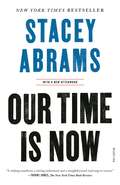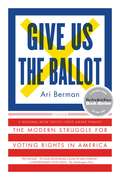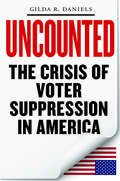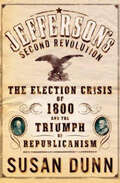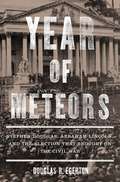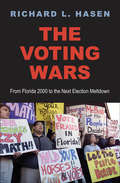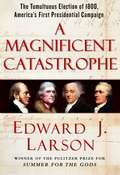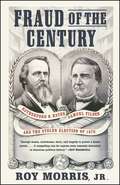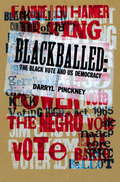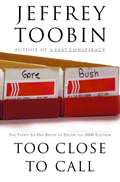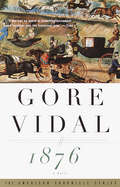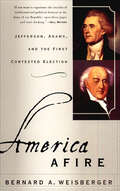Special Collections
Post-Election Uncertainty
Description: To help make sense of this moment, The New York Public Library has put together a new reading list that explores our electoral process and past elections that, like right now, did not have an immediate or clear outcome. #adults
- Table View
- List View
Our Time Is Now
by Stacey AbramsNEW YORK TIMES BESTSELLER"With each page, she inspires and empowers us to create systems that reflect a world in which all voices are heard and all people believe and feel that they matter." —Kerry Washington "This is a narrative that describes the urgency that compels me and millions more to push for a different American story than the one being told today. It's a story that is one part danger, one part action, and all true. It's a story about how and why we fight for our democracy and win." —Stacey Abrams Celebrated national leader and bestselling author Stacey Abrams offers a blueprint to end voter suppression, empower our citizens, and take back our country. A recognized expert on fair voting and civic engagement, Abrams chronicles a chilling account of how the right to vote and the principle of democracy have been and continue to be under attack. Abrams would have been the first African American woman governor, but experienced these effects firsthand, despite running the most innovative race in modern politics as the Democratic nominee in Georgia. Abrams didn’t win, but she has not conceded. The book compellingly argues for the importance of robust voter protections, an elevation of identity politics, engagement in the census, and a return to moral international leadership. Our Time Is Now draws on extensive research from national organizations and renowned scholars, as well as anecdotes from her life and others’ who have fought throughout our country’s history for the power to be heard. The stakes could not be higher. Here are concrete solutions and inspiration to stand up for who we are—now.
Give Us The Ballot
by Ari BermanCountless books have been written about the civil rights movement, but far less attention has been paid to what happened after the dramatic passage of the Voting Rights Act in 1965 and the turbulent forces it unleashed. In this groundbreaking narrative history, Ari Berman charts both the transformation of American democracy under the VRA and the counterrevolution that has sought to limit it from the moment the act was signed into law. The VRA is widely regarded as the crowning achievement of the civil rights movement, and yet―more than fifty years later―the battles over race, representation, and political power continue, as lawmakers devise new strategies to keep minorities out of the voting booth, while the Supreme Court has declared a key part of the Voting Rights Act unconstitutional.
Through meticulous research, in-depth interviews, and incisive on-the-ground reporting, Give Us the Ballot offers the first comprehensive history of its kind, and provides new insight into one of the most vital political and civil rights issues of our time.
Uncounted
by Gilda R. DanielsAn answer to the assault on voting rights—crucial reading in advance of the 2020 presidential electionThe Voting Rights Act of 1965 is considered one of the most effective pieces of legislation the United States has ever passed. It enfranchised hundreds of thousands of voters, particularly in the American South, and drew attention to the problem of voter suppression. Yet in recent years there has been a continuous assault on access to the ballot box in the form of stricter voter ID requirements, meritless claims of rigged elections, and baseless accusations of voter fraud. In the past these efforts were aimed at eliminating African American voters from the rolls, and today, new laws seek to eliminate voters of color, the poor, and the elderly, groups that historically vote for the Democratic Party.Uncounted examines the phenomenon of disenfranchisement through the lens of history, race, law, and the democratic process. Gilda R. Daniels, who served as Deputy Chief in the United States Department of Justice Civil Rights Division and more than two decades of voting rights experience, argues that voter suppression works in cycles, constantly adapting and finding new ways to hinder access for an exponentially growing minority population. She warns that a premeditated strategy of restrictive laws and deceptive practices has taken root and is eroding the very basis of American democracy—the right to vote!
Jefferson's Second Revolution
by Susan DunnAn &“excellent&” history of the tumultuous early years of American government, and a constitutional crisis sparked by the Electoral College (Booklist). In the election of 1800, Federalist incumbent John Adams, and the elitism he represented, faced Republican Thomas Jefferson. Jefferson defeated Adams but, through a quirk in Electoral College balloting, tied with his own running mate, Aaron Burr. A constitutional crisis ensued. Congress was supposed to resolve the tie, but would the Federalists hand over power peacefully to their political enemies, to Jefferson and his Republicans? For weeks on end, nothing was certain. The Federalists delayed and plotted, while Republicans threatened to take up arms. In a way no previous historian has done, Susan Dunn illuminates this watershed moment in American history. She captures its great drama, gives us fresh, finely drawn portraits of the founding fathers, and brilliantly parses the enduring significance of the crisis. The year 1800 marked the end of Federalist elitism, pointed the way to peaceful power shifts, cleared a place for states&’ rights in the political landscape—and set the stage for the Civil War. &“Dunn, a scholar of eighteenth-century American history, has provided a valuable reminder of an election in which the stakes were truly enormous and the political vituperation was far more poisonous than the relatively moderate attacks heard today. . . . An excellent work that effectively explains this critical contest that shaped the history of the new republic.&” —Booklist &“Dunn does a superb job of recounting the campaign, its cast of characters, and the election&’s bizarre conclusion in Congress. That tense standoff could have plunged the country into a disastrous armed conflict, Dunn explains, but instead cemented the legitimacy of peaceful, if not smooth, transfers of power.&” —Publishers Weekly &“Dunn simultaneously teaches and enthralls with her eloquent, five-sensed descriptions of the people and places that shaped our democracy.&” —Entertainment Weekly
Year of Meteors
by Douglas R. EgertonAn analysis of the events that led up to the 1860 Presidential election and the machinations that culminated in the Civil War.
The Voting Wars
by Richard L. HasenIn 2000, just a few hundred votes out of millions cast in the state of Florida separated Republican presidential candidate George W. Bush from his Democratic opponent, Al Gore. The outcome of the election rested on Florida's 25 electoral votes, and legal wrangling continued for 36 days. Then, abruptly, one of the most controversial Supreme Court decisions in U. S. history,Bush v. Gore, cut short the battle. Since the Florida debacle we have witnessed a partisan war over election rules. Election litigation has skyrocketed, and election time brings out inevitable accusations by political partisans of voter fraud and voter suppression. These allegations have shaken public confidence, as campaigns deploy “armies of lawyers” and the partisan press revs up when elections are expected to be close and the stakes are high. Richard L. Hasen, a respected authority on election law, chronicles and analyzes the battles over election rules from 2000 to the present. From a nonpartisan standpoint he explores the rising number of election-related lawsuits and charges of voter fraud as well as the decline of public confidence in fair results. He explains why future election disputes will be worse than previous ones—more acrimonious, more distorted by unsubstantiated allegations, and amplified by social media. No reader will fail to conclude with Hasen that election reform is an urgent priority, one that demands the attention of conscientious citizens and their elected representatives. Also available:The Fraudulent Fraud Squad, an e-excerpt fromThe Voting WarsReleased February 2012 9780300187489 $1. 99
A Magnificent Catastrophe
by Edward J. Larson"They could write like angels and scheme like demons." So begins Pulitzer Prize-winner Edward Larson's masterful account of the wild ride that was the 1800 presidential election -- an election so convulsive and so momentous to the future of American democracy that Thomas Jefferson would later dub it "America's second revolution." This was America's first true presidential campaign, giving birth to our two-party system and indelibly etching the lines of partisanship that have so profoundly shaped American politics ever since. The contest featured two of our most beloved Founding Fathers, once warm friends, facing off as the heads of their two still-forming parties -- the hot-tempered but sharp-minded John Adams, and the eloquent yet enigmatic Thomas Jefferson -- flanked by the brilliant tacticians Alexander Hamilton and Aaron Burr, who later settled their own differences in a duel. The country was descending into turmoil, reeling from the terrors of the French Revolution, and on the brink of war with France. Blistering accusations flew as our young nation was torn apart along party lines: Adams and his elitist Federalists would squelch liberty and impose a British-style monarchy; Jefferson and his radically democratizing Republicans would throw the country into chaos and debase the role of religion in American life. The stakes could not have been higher. As the competition heated up, other founders joined the fray -- James Madison, John Jay, James Monroe, Gouverneur Morris, George Clinton, John Marshall, Horatio Gates, and even George Washington -- some of them emerging from retirement to respond to the political crisis gripping the nation and threatening its future. Drawing on unprecedented, meticulous research of the day-to-day unfolding drama, from diaries and letters of the principal players as well as accounts in the fast-evolving partisan press, Larson vividly re-creates the mounting tension as one state after another voted and the press had the lead passing back and forth. The outcome remained shrouded in doubt long after the voting ended, and as Inauguration Day approached, Congress met in closed session to resolve the crisis. In its first great electoral challenge, our fragile experiment in constitutional democracy hung in the balance. A Magnificent Catastrophe is history writing at its evocative best: the riveting story of the last great contest of the founding period.
Fraud of the Century
by Roy Morris Jr.The bitter 1876 contest between Ohio Republican Governor Rutherford B. Hayes and New York Democratic Governor Samuel Tilden was the most sensational and corrupt presidential election in American history. It was also, in many ways, the final battle of the Civil War. Although Tilden received some 265,000 more popular votes than his opponent, and needed only one more electoral vote for victory, contested returns in three southern states still under Republican-controlled Reconstruction governments ultimately led to Hayes's being declared the winner after four tense months of brazen political intrigue and threats of violence that brought armed troops into the streets of the nation's capital. In this major work of popular history and scholarship, Roy Morris, Jr., takes readers to Philadelphia in America's centennial year, where millions celebrated the nation's industrial might and democratic ideals; to the nation's heartland, where Republicans refought the Civil War by waging a cynical "bloody shirt" campaign to tar the Democrats as the party of disunion and rebellion; and finally into the smoke-filled back rooms of Washington, D.C., where the will of the people was thwarted and the newly won rights of four million former slaves were ignored, leading to nearly ninety years of legalized segregation in the South.
Blackballed
by Darryl PinckneyBlackballed is Darryl Pinckney's meditation on a century and a half of participation by blacks in US electoral politics. In this combination of memoir, historical narrative, and contemporary political and social analysis, he investigates the struggle for black voting rights from Reconstruction through the civil rights movement to Barack Obama's two presidential campaigns. Drawing on the work of scholars, the memoirs of civil rights workers, and the speeches and writings of black leaders like Martin Luther King and Stokely Carmichael, Andrew Young and John Lewis, Pinckney traces the disagreements among blacks about the best strategies for achieving equality in American society as well as the ways in which they gradually came to create the Democratic voting bloc that contributed to the election of the first black president. Interspersed through the narrative are Pinckney's own memories of growing up during the civil rights era and the reactions of his parents to the changes taking place in American society. He concludes with an examination of ongoing efforts by Republicans to suppress the black vote, with particular attention to the Supreme Court's recent decision striking down part of the Voting Rights Act of 1965. Also included here is Pinckney's essay "What Black Means Now," on the history of the black middle class, stereotypes about blacks and crime, and contemporary debates about "post-blackness."
Too Close to Call
by Jeffrey ToobinFrom the best-selling author of A Vast Conspiracy and The Run of His Life comes Too Close to Call--the definitive story of the Bush-Gore presidential recount. A political and legal analyst of unparalleled journalistic skill, Jeffrey Toobin is the ideal writer to distill the events of the thirty-six anxiety-filled days that culminated in one of the most stunning Supreme Court decisions in history.
Packed with news-making disclosures and written with the drive of a legal thriller, Too Close to Call takes us inside James Baker's private jet, through the locked gates to Al Gore's mansion, behind the covered-up windows of Katherine Harris's office, and even into the secret conference room of the United States Supreme Court. As the scene shifts from Washington to Austin and into the remote corners of the enduringly strange Sunshine State, Toobin's book will transform what you thought you knew about the most extraordinary political drama in American history.
The Florida recount unfolded in a kaleidoscopic maze of bizarre concepts (chads, pregnant and otherwise), unfamiliar people in critically important positions (the Florida Supreme Court), and familiar people in surprising new places (the Miami relatives of Elián González, in a previously undisclosed role in this melodrama). With the rich characterization that is his trademark, Toobin portrays the prominent strategists who masterminded the campaigns--the Daleys and the Roves--and also the lesser-known but influential players who pulled the strings, as well as the judges and justices whose decisions determined the final outcome. Toobin gives both camps a treatment they have not yet received--remarkably evenhanded, nonpartisan, and entirely new.
The post-election period posed a challenge to even the most zealous news junkie: how to keep up with what was happening and sort out the important from the trivial. Jeffrey Toobin has now done this--and then some. With clarity, insight, humor, and a deep understanding of the law, he deconstructs the events, the players, and the often Byzantine intricacies of our judicial system. A remarkable account of one of the most significant periods in our country's history, Too Close to Call is endlessly surprising, frequently poignant, and wholly addictive.
1876
by Gore VidalThe third volume of Gore Vidal's magnificent series of historical novels aimed at demythologizing the American past, 1876 chronicles the political scandals and dark intrigues that rocked the United States in its centennial year.------Charles Schermerhorn Schuyler, Aaron Burr's unacknowledged son, returns to a flamboyant America after his long, self-imposed European exile. The narrator of Burr has come home to recoup a lost fortune by arranging a suitable marriage for his beautiful daughter, the widowed Princess d'Agrigente, and by ingratiating himself with Samuel Tilden, the favored presidential candidate in the centennial year. With these ambitions and with their own abundant charms, Schuyler and his daughter soon find themselves at the centers of American social and political power at a time when the fading ideals of the young republic were being replaced by the excitement of empire.------"A glorious piece of writing," said Jimmy Breslin in Harper's. "Vidal can take history and make it powerful and astonishing." Time concurred: "Vidal has no peers at breathing movement and laughter into the historical past."------With a new Introduction by the author.
America Afire
by Bernard A. WeisbergerAmerica Afire is the powerful story of the election of 1800, arguably the most important election in America's history and certainly one of the most hotly disputed. Former allies Adams and Jefferson, president versus vice president, Federalist versus Republican, squared off in a vicious contest that resulted in broken friendships, scandals, riots, slander, and jailings in the fourth presidential election under the Constitution.
